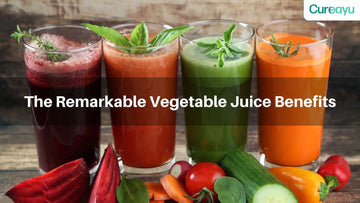In today's health-conscious world, many are turning to vegetable juices as a quick and efficient way to boost their nutrient intake. Vegetable juices, especially green juices, have gained immense popularity due to their impressive array of health benefits. Packed with vitamins, minerals, and antioxidants, these juices are believed to support overall well-being, improve digestion, and promote radiant skin. In this blog, we will explore the myriad benefits of vegetable juices, delve into what green juice is, discuss potential risks, and provide recipes and tips for incorporating these nutritious drinks into your daily routine.
Also Read: Top 10 Refreshing Summer Drinks to Keep You Cool and Energized
What Is Green Juice?
Green juice is a beverage made primarily from green vegetables. It often includes ingredients like spinach, kale, cucumber, celery, and sometimes a small amount of fruit for sweetness. Green juices are rich in chlorophyll, the pigment that gives plants their green color, and are known for their detoxifying properties. These juices are a convenient way to consume a large quantity of vegetables, offering a concentrated dose of essential nutrients. Unlike smoothies, green juices typically have the fiber removed, making them easier for the body to digest and absorb quickly.
Vegetable Juice Benefits
Boosts Immunity: Vegetable juices are rich in vitamins C and A, both of which are known to strengthen the immune system. Regular consumption can help ward off common illnesses and keep the immune system functioning optimally.
Aids Digestion: Juices made from vegetables like ginger, celery, and cucumber can aid digestion by reducing inflammation and promoting healthy bowel movements. They also contain enzymes that help break down food more efficiently
Enhances Detoxification: The chlorophyll in green juices helps detoxify the liver, aiding in the removal of harmful toxins from the body. This natural detox process can lead to improved liver function and overall health.
Promotes Healthy Skin: The high levels of antioxidants and vitamins in vegetable juices contribute to healthier, glowing skin. Vitamins A and C, in particular, are essential for skin repair and rejuvenation.
Supports Weight Loss: Low in calories but high in nutrients, vegetable juices can be an effective part of a weight loss regimen. They help to keep you full, reducing the temptation to snack on unhealthy foods.
Improves Heart Health: Vegetables like beets and carrots contain nitrates, which can help lower blood pressure and improve cardiovascular health. Regular consumption of vegetable juices can contribute to a healthier heart.
Increases Energy Levels: The natural sugars and B vitamins in vegetable juices provide a quick energy boost without the crash associated with caffeine or sugary snacks. They can help you stay energized throughout the day.
Enhances Mental Clarity: Nutrient-dense vegetable juices can improve cognitive function and mental clarity. Ingredients like spinach and kale are high in folate and iron, which support brain health.
Alkalizes the Body: Many vegetables are alkaline in nature, which helps to balance the body’s pH levels. An alkaline environment in the body can reduce the risk of chronic diseases and improve overall health.
Hydrates the Body: Vegetables like cucumber and celery have high water content, which helps keep the body hydrated. Proper hydration is crucial for all bodily functions, including digestion, circulation, and temperature regulation.
Also Read: Detox Water Benefits: A Refreshing Way to Boost Your Health
Potential Risks of Juices
1. High Sugar Content: Adding too much fruit to vegetable juices can increase the sugar content, leading to potential spikes in blood sugar levels. It's important to balance fruits and vegetables to avoid this issue.
2. Lack of Fiber: Juicing removes most of the fiber from vegetables, which is essential for digestive health. Relying solely on juices can lead to a deficiency in dietary fiber.
3. Nutrient Imbalance: Consuming only vegetable juices may result in an imbalance of nutrients. It's crucial to maintain a varied diet to ensure all essential nutrients are consumed.
4. Potential for Overconsumption: It's easy to consume large quantities of juice, which can lead to excessive intake of certain vitamins and minerals. Moderation is key to avoid any potential negative effects.
5. Food Safety Concerns: Freshly made juices should be consumed immediately or stored properly to avoid bacterial growth. Improper handling can lead to foodborne illnesses.
Also Read: The Health Wonders of Green Tea: A Cup of Wellness
Green Juice Ingredients
To make a nutritious green juice, consider using the following ingredients:
- Spinach
- Kale
- Cucumber
- Celery
- Green apple
- Lemon
- Ginger
- Parsley
- Mint
Green Juice Recipe
Here's a simple and refreshing green juice recipe:
Ingredients:
- 1 cup spinach
- 1 cup kale
- 1 cucumber
- 2 celery stalks
- 1 green apple
- 1 lemon (peeled)
- 1-inch piece of ginger
- A handful of parsley
- A few mint leaves
Instructions:
- Wash all the ingredients thoroughly.
- Cut the cucumber, celery, and apple into chunks.
- Add all the ingredients into a juicer.
- Blend until smooth.
- Pour the juice into a glass and enjoy immediately for maximum freshness and nutrient retention.
Best Time to Drink Vegetable Juice
The best time to drink vegetable juice is in the morning on an empty stomach. This allows your body to absorb the nutrients more efficiently and kick starts your metabolism for the day. Drinking juice in the morning can also provide a natural energy boost, setting a positive tone for the day ahead. Another optimal time is before or after a workout, as the nutrients can help with energy levels and recovery. Avoid drinking vegetable juice late in the evening, as the natural sugars might interfere with your sleep patterns.
Conclusion
Incorporating vegetable juices into your diet can offer numerous health benefits, from boosting immunity to promoting healthy skin. However, it's important to be mindful of potential risks, such as high sugar content and lack of fiber. By choosing the right ingredients and consuming juices at the optimal time, you can maximize the benefits while minimizing any downsides. Remember, vegetable juices should complement a balanced diet, not replace whole vegetables and other essential food groups. With the right approach, you can enjoy the refreshing and health-boosting properties of vegetable juices as part of a holistic approach to wellness.








